《趣趣英语》unit3
英语人教版六年级下册Unit3 PartB Read and Write

The second reading: (listening)
Task1---Q: How was that day?
Task2---sheet: p29 What happened to Wu Yifan’s family?
Mum ate some bad fruit and didn’t fell well.
But what did I do then? I made some delicious cakes with my sister. We are First, it was a bad day. It is rainy. happy. So it wasgo also a good day. I can’t outside. As the saying goes, “Dad luck often brings good luck.”
Task: Write about Yifan’s bad but good day.
Today was a bad but good day for me. First, it was a bad day. My mum ate some bad fruit and didn’t feel well. ______________________________________. But what did I do then? We dressed up and made a funny play. ______________________________________. So it was also a good day. As the saying goes, “Bad luck often brings good luck.”
阿斯顿英语教材趣趣三级答案

趣趣英语三级Unit11.What’s your telephone number? It’s 408-6139. (b)2. How old are you? I’m seven. (b)3.Hello! I’m Dug-bo. I’m ten years old. I like swimming. (a)4. Hi! I’m Yal-mi. I like dogs. I can play the piano. (b)5.This is Too-dul. He’s nine years old. He lives in Jamsil-dong.His telephone number is 664-0873. He likes pizza. He can play baseball.Unit21.What day is it today? It’s Friday. (b)2.What do you do on Sundays? I play badminton. (a)3.What are you doing? I’m cutting. (a)4.What’s Sim-soon doing? She’s studying English. (b)5. a. What do you do on Saturdays?b. I go to the swimming pool.6. a. What is Sim-toong doing?b. He is playing video games.Unit31.I have small eyes. (b)2.She is fat. (a)3.What do you do? I’m a fire fighter. (a)4.What does he do? He’s a dentist. (b)5. a.Is the car new?b.Yes,it is.6. a.Is the train fast?b.No,it isn’t.Unit41.What do you have? I have some tomatoes. (b)2.Do you have any carrots? No,I don’t. I have some cucumbers. (a)3.What does Sim-soon have? She has some kittens. (a)4.Does Sim-toong have any bunnies? Yes,he does. (a)5. a. What do you have?b. I have some cabbages.6. a. Do you have any goldfish?b. Yes,I do.Unit51.What time do you go to school? I go to school at eight.(b)2.What time do you go to bed? I go to bed at nine. (a)3.What do you do after school? I watch TV. (b)4.What does Sim-toong do after school? He listen s to music.(a)5. a. What time do you get up?b. I get up at seven.6. a. What does Dol-dol do after school?b. He studys English.Unit61.How do you feel today? I’m happy. (a)2.How does Yal-mi feel? She’s angry. (a)3.What’s favorite sport? My favorite sport is tennis.(a)4.What’s favorite season? My favorite season is winter.(a)5. a. How do you feel today?b. I don’t feel good.I’m sick.6. a. How does Sim-toong feel?b. He’s tired.Unit71.Which cap do you want? I want the yellow one. (b)2.Which bag do you want? I want the green one. (a)3.Which jeans do you want? I want the new one. (a)4.Which blouse do you want? I want the plaid one. (b)5. a.How much is this?b.It’s six hundred won.6. a.How much is this?b.It’s fifteen dollars.Unit81.What’s the date today? It’s August 10th. (b)2.What’s the date today? It’s December 25th. (a)3.What time is it now? It’s three o’clock. (b)4.What time is it now? It’s seven forty-five. (a)5.It’s five fifteen.=It’s a quarter after five.6.It’s two forty-five.=It’s a quarter to three.。
Unit 3 Holiday fun (story time)(说课稿)-2022-2023学年英语
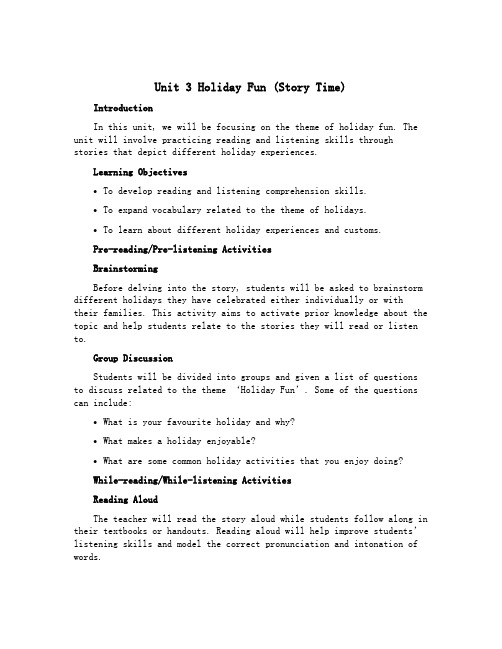
Unit 3 Holiday Fun (Story Time)IntroductionIn this unit, we will be focusing on the theme of holiday fun. The unit will involve practicing reading and listening skills throughstories that depict different holiday experiences.Learning Objectives•To develop reading and listening comprehension skills.•To expand vocabulary related to the theme of holidays.•To learn about different holiday experiences and customs.Pre-reading/Pre-listening ActivitiesBrainstormingBefore delving into the story, students will be asked to brainstorm different holidays they have celebrated either individually or withtheir families. This activity aims to activate prior knowledge about the topic and help students relate to the stories they will read or listen to.Group DiscussionStudents will be divided into groups and given a list of questions to discuss related to the theme ‘Holiday Fun’. Some of the questions can include:•What is your favourite holiday and why?•What makes a holiday enjoyable?•What are some common holiday activities that you enjoy doing?While-reading/While-listening ActivitiesReading AloudThe teacher will read the story aloud while students follow along in their textbooks or handouts. Reading aloud will help improve students’ listening skills and model the correct pronunciation and intonation of words.Story MappingStudents will be asked to map out the story using a graphic organizer. The graphic organizer will help students identify the main characters, setting, plot, and sequence of events. This activity willaid in improving students’ reading comprehension skills.Vocabulary StudyStudents will be introduced to new vocabulary words related to the story before reading or listening to it. The teacher can use different techniques, such as using flashcards, acting out the words, or using them in sentences.Post-reading/Post-listening ActivitiesStory RetellStudents will be asked to retell the story in their own words,either individually or in groups. This activity aims to encourage students to summarize the story and identify the main events accurately.Make a Holiday PosterAfter reading the story, students will be asked to make a holiday poster depicting their favourite holiday. The poster can include illustrations, pictures, or written descriptions about what makes the holiday special to them.Quiz TimeTo test students’ comprehension of the story, the teacher will design a quiz with questions related to the story’s characters, setting, and plot. This activity aims to assess students’ listening and read ing comprehension skills.ConclusionThis unit aims to develop students’ reading and listening comprehension skills through stories that depict different holiday experiences. The unit includes pre-reading/pre-listening activities, while-reading/while-listening activities, and post-reading/post-listening activities that aim to engage students and facilitate their learning.。
人教PEP版英语六年级下册《Unit 3 Part B 第一课时》教学课件
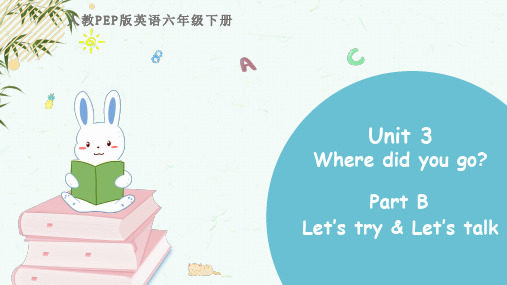
A. was
B. is
C. were
Байду номын сангаас
三、小练笔。 请用英语介绍一下你的上个寒假去了哪?怎么去的?
做了什么事情?不少于5句话。 _L_a_s_t__w_i_n_t_e_r_h__o_li_d_a_y_,_I__w_e_n_t__t_o_S__h_a_n_g_h_a_i_________ _w_i_t_h__m_y__m__o_m_._W__e__w_e_n_t__t_h_e_r_e__b_y__t_r_a_in_._I_________ _w_a__s_v_e_r_y__h_a_p_p_y_._W__e__w_e_n__t_s_h_o_p_p_i_n_g_._W__e__________ _b_o_u_g_h__t_l_o_t_s_o_f__g_i_f_t_s_f_o_r__o_u_r_f_r_i_e_n_d_s_.____________
Sarah: Hainan is … Amy: We …
Wu Yifan: How was … Amy: It was ….
Sarah: Sounds … Amy: Sure.
Amy’s winter holiday.
Amy went to _______ with her family over the winter holiday. They went there________. She ________ and _________ there.
Sarah: Hainan is far from here. How did you go there? Amy: We went there by plane.
Wu Yifan: How was the beach? What did you do there? Amy: It was beautiful. I took lots of pictures, and I also went swimming.
Unit3 Holiday Fun the first period(Story Time) 教案
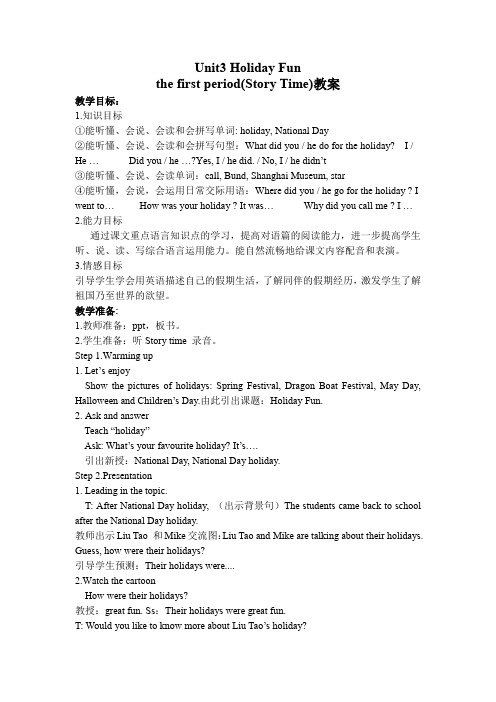
Unit3 Holiday Funthe first period(Story Time)教案教学目标:1.知识目标①能听懂、会说、会读和会拼写单词: holiday, National Day②能听懂、会说、会读和会拼写句型:What did you / he do for the holiday? I / He … Did you / he …?Yes, I / he did. / No, I / he didn’t③能听懂、会说、会读单词:call, Bund, Shanghai Museum, star④能听懂,会说,会运用日常交际用语:Where did you / he go for the holiday ? I went to… How was your holiday ? It was… Why did you call me ? I …2.能力目标通过课文重点语言知识点的学习,提高对语篇的阅读能力,进一步提高学生听、说、读、写综合语言运用能力。
能自然流畅地给课文内容配音和表演。
3.情感目标引导学生学会用英语描述自己的假期生活,了解同伴的假期经历,激发学生了解祖国乃至世界的欲望。
教学准备:1.教师准备:ppt,板书。
2.学生准备:听Story time 录音。
Step 1.Warming up1. Let’s enjoyShow the pictures of holidays: Spring Festival, Dragon Boat Festival, May Day, Halloween and Children’s Day.由此引出课题:Holiday Fun.2. Ask and answerTeach “holiday”Ask: What’s your favourite holiday? It’s….引出新授:National Day, National Day holiday.Step 2.Presentation1. Leading in the topic.T: After National Day holiday, (出示背景句)The students came back to school after the National Day holiday.教师出示Liu Tao 和Mike交流图:Liu Tao and Mike are talking about their holidays. Guess, how were their holidays?引导学生预测:Their holidays were....2.Watch the cartoonHow were their holidays?教授:great fun. Ss:Their holidays were great fun.T: Would you like to know more about Liu Tao’s holiday?3. Read and learn(I)1.) 学生自读前半段课文,找出问句:Where did you go for the holiday?What did you do there?2.) 逐句出示两个问句(并板书),以听音方式出示答句,并教授其中新词: did, the Bund, the Shanghai Museum.3.) 逐句出示课文录音,学生跟读。
【】Unit3 Lesson3 Have Fun(习题及解析)北师大 (三起)(秋)三年级英语上册
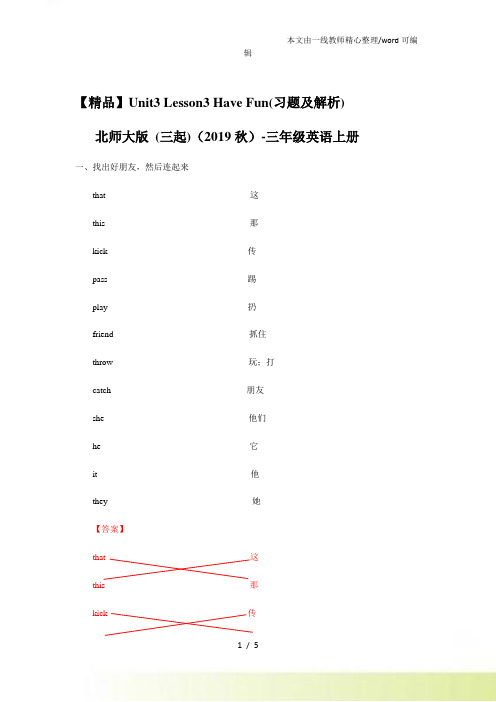
【精品】Unit3 Lesson3 Have Fun(习题及解析) 北师大版(三起)(2019秋)-三年级英语上册一、找出好朋友,然后连起来that 这this 那kick 传pass 踢play 扔friend 抓住throw 玩;打catch 朋友she 他们he 它it 他they 她【答案】that 这this 那kick 传pass 踢play 扔friend 抓住throw 玩;打catch 朋友she 他们he 它it 他they 她二、情景选择。
根据上句,选择合适的应答句。
( )1--- Who’s this?--- _______________A. That’s Tommy.B. This is Tommy.C. He is a teacher.( )2--- Who’s that?--- _______________A. That’s Ken.B. This is Ken.C. She is a boy.( )3--- ______________!--- OK!A. Hello, Mocky!B. Goodbye, Mocky.C. Pass the ball, Mocky.( )4--- Wh o’s this?--- This is Cathy. ____ is my friend.A. ItB.SheC. He【答案】1. B 2.A 3. C 4.B【解析】1. This 是这的意思,这是近距离的介绍,回答时候也用this 来回答,所以只有B This is Tommy. 最合适。
2.That 是那的意思,这是远距离的介绍,回答时候也用that 来回答,所以只有AThat’s Ken.最合适。
3.选项A是打招呼用语,选项B是说再见,回答是OK,显然AB不合适,C的是传球,句意合理,所以选择C。
4.Cathy是个女孩子,作主语时可以用代词she。
所以只有B合适。
三、争做小翻译家1. Let’s play football.________________________________2. Who’s that?_________________________________3. Who’s this?_________________________________4. She’s my friend._________________________________【答案】1. 让我们一起踢足球吧!2. 那是谁?3. 这是谁?4. 她是我的朋友。
趣趣英语教研活动总结-如何上好英语电影课Movie Class

趣趣英语教研活动总结主持人:Bob记录人:Chen Jie会议时间:2019年11月11日10:00-15:30会议地点:A教室参会人员:Mike Robin Zip Sarah本次教研会无迟到、请假人员。
趣趣英语教研活动于11日在A教室进行。
本次会议主要分为两个流程:第一项话题讨论:如何上好英语电影课Movie Class?学生喜爱看电影,Movies也逐渐成为英语教学的一大亮点。
那么如何教授英语电影课,引导学生用英语思维,提高其听力水平,培养学生对英语句子的理解和运用能力?我们可以从以下几个方面入手:一、播放电影前:1. 介绍电影的背景,帮助学生了解故事的梗概。
可从电影名字入手,引导学生说出电影中的主要人物。
像《狮子王》中的辛巴Simba-荣耀王国的国王,木法沙Mufasa-----辛巴的父亲等。
看完电影后再引导,Why do you like Simba?等等。
2. 提出问题,如:故事的四要素:时间、地点、人物、事件(when/ where / who / what)。
让学生带着问题看电影。
二、播放电影:1.按照课堂教学的标准进度,将一部电影分成若干节,每节的时间严格控制。
第一遍整体播放,带领学生全身心欣赏电影,了解故事梗概并找到老师所提问题的答案。
2.第二遍分段播放。
教师提前观看电影,制作PPT展示生词、重点及与直线英语重合的常用句型拎出来,通过游戏或互动的方式进行巩固和强化。
如定格画面,通过画面让学生猜测生词的意思;实时提出问题,让学生抢答;关注字幕,带读,必要时记笔记。
3.再整体播放一遍影片。
及时复习重点短语及句子。
4.设置活动游戏。
1)看谁模仿的像?可以让所有的孩子去模仿,比一比看谁配的音更棒。
2)分角色朗读或表演剧情。
可以事先在网络搜索下载台词,看完一小节让孩子去朗读、表演,也可以在结课PARTY上集体展示,让家长了解孩子学习成果。
三、播放电影后打印作业条,将重点内容整理成作业条的形式发给学生。
六上英语教材深度解读(Unit 3 Holiday fun 第3课时 Fun time 译林版
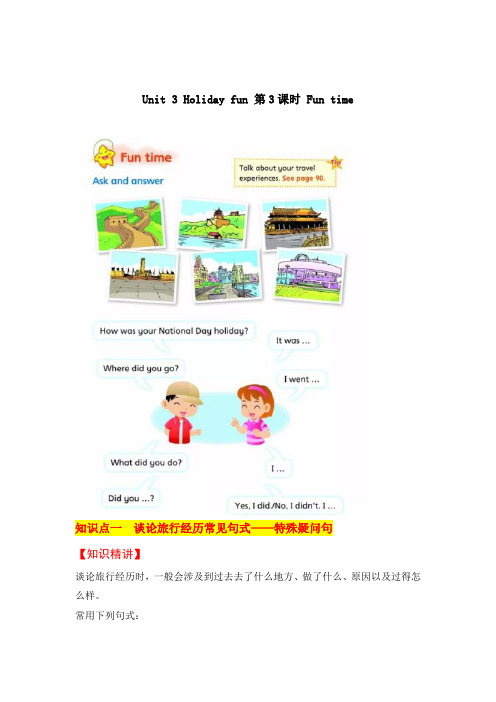
Unit 3 Holiday fun 第3课时 Fun time知识点一谈论旅行经历常见句式——特殊疑问句【知识精讲】谈论旅行经历时,一般会涉及到过去去了什么地方、做了什么、原因以及过得怎么样。
常用下列句式:(1)特殊疑问词Where/What/Why+一般疑问句语序(did you)+其他?eg.A: Where did you go for the holiday? B: I went to the museum.(重在回答地点) A: What did you do for the holiday? B: I visited the Great Wall.(重在事情。
) A: Why did you call me? B: Because I wanted to see a movie with you. (重在陈述原因。
)(2)How was +其他?询问过去的……怎么样,答语一般用描述性的形容词。
eg.A:How was your holiday? B: It was great.【经典例题】交际语匹配。
(1)What did you do last Sunday? ________(2)Where did Mike go?________(3)Did you watch a film yesterday?________(4)Why did you call him?________(5)How was the film?________A. Yes, I did.B. Because I wanted to give him a fishC. I visited my aunt.D. He went to the park.E. It was fun.【名师解析】(1)What did you do last Sunday? 意为:上个周日你做什么了?(2)Where did Mike go?意为:麦克去了哪里?(3)Did you watch a film yesterday?意为:昨天你看电影了吗?(4)Why did you cal l him?意为:你为什么给他打电话?(5)How was the film?意为:电影怎么样?所以答案为:CDABE。
